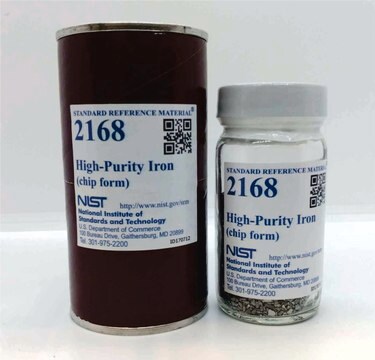About This Item
Recommended Products
Assay
99.98% trace metals basis
form
chips
resistivity
9.71 μΩ-cm
bp
2750 °C (lit.)
mp
1535 °C (lit.)
density
7.86 g/mL at 25 °C (lit.)
SMILES string
[Fe]
InChI
1S/Fe
InChI key
XEEYBQQBJWHFJM-UHFFFAOYSA-N
Storage Class Code
13 - Non Combustible Solids
WGK
nwg
Flash Point(F)
Not applicable
Flash Point(C)
Not applicable
Personal Protective Equipment
Certificates of Analysis (COA)
Search for Certificates of Analysis (COA) by entering the products Lot/Batch Number. Lot and Batch Numbers can be found on a product’s label following the words ‘Lot’ or ‘Batch’.
Already Own This Product?
Find documentation for the products that you have recently purchased in the Document Library.
Articles
Higher transition metal silicides are ideal for anisotropic thermoelectric conversion due to their Seebeck coefficient anisotropy and mechanical properties.
Our team of scientists has experience in all areas of research including Life Science, Material Science, Chemical Synthesis, Chromatography, Analytical and many others.
Contact Technical Service

